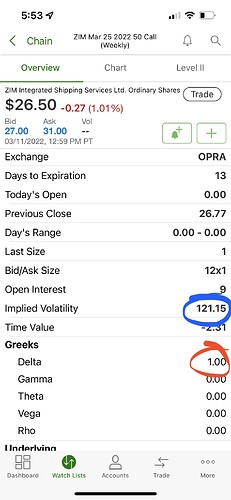I’m curious if any of you have used a dividend capture strategy before. I personally haven’t, but it seems to me that ZIM’s pending $17 dividend is a pretty incredible opportunity for using this strategy. Given the share price, the minimum capital requirement would be about $5,000.
For those who aren’t familiar: dividend capture is basically what it sounds like. The goal is to capture dividend income without tying up capital for long periods of time—and doing it relatively safely. I think in most cases it’s not worth the effort for retail investors since dividends are usually a small percentage payout, but ZIM is a special beast right now. Its upcoming $17 dividend is over 20% of its share price.
I ran some numbers based on Friday’s closing ($79.14)—this is how I think it could play out:
Any time between now and 2 days before ex-div to be safe:
Buy 100 shares: -$7,914
Sell 1x 3/25 50c: +$2,900
Immediately after ex-div (assuming share price drops by the dividend amount: $17):
Sell 100 shares: +$6,214
Buy 1x 3/25 50c: -$1,200
As noted, the above assumes that the share price will drop to accommodate the dividend payout. There’s some disagreement in the ZIM earnings thread as to whether or not this will happen, but I don’t think it actually matters in this strategy anyway. The calls are so deep in the money that the gain or loss of the share price should cancel out that of the calls regardless of what the movement actually turns out to be.
Anyhow, at this point your net gain/loss is roughly $0, and you’ve qualified for the dividend payout—which in this case is $1,700. All for an initial capital outlay of $5,000.
One potential downside is being assigned early and thus not qualifying for the dividend, making the effort all for naught—but that doesn’t seem like much of an issue IMO.
Are there other issues/risks? I’ve never done this before but it seems like pretty easy (and safe) money… a relatively quick ~34% ROI. What am I missing?
EDIT: The $1,700 and 34% numbers are reduced to $1,275 and 25.5%, respectively. Details in this post below.
